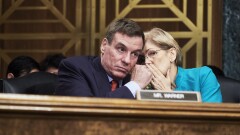WASHINGTON — The Federal Housing Finance Agency's acting director, Joseph Otting, has promised that the White House is set to announce an administrative plan to make changes to Fannie Mae and Freddie Mac. But the mechanics of such a plan as well as the timeline have left mortgage industry insiders scratching their heads.
In a staff meeting last week, Otting told FHFA employees that within the next month, the White House and the Treasury Department would set a direction for the future of housing finance in the U.S that would define the agency’s role in a new system. The comments were first reported by MarketWatch.
“The Treasury and White House viewpoint is that the [FHFA] director and the secretary of Treasury have tremendous authority and that they would act, I think, independent of legislation if they thought it was the right thing to do,” Otting said at the meeting, according to a recording obtained by Politico.
Otting promised significant progress on overhauling the system within six to 18 months — which sent the shares of Fannie and Freddie soaring Thursday to their highest levels in at least a year — but he failed to provide specifics of such an administrative plan, and his comments appeared at odds with those previously made by other administration officials. Treasury Secretary Steven Mnuchin has discussed letting Congress do the heavy lifting on housing finance reform.
Otting also said Mark Calabria, an administration official nominated to become the permanent FHFA director, had "signed off" on the reform plan to be announced by the White House. But Calabria, the chief economist to Vice President Mike Pence, is still awaiting confirmation. In response to Otting's comments, senior Democratic lawmakers
Here are key questions about Otting and others' housing finance reform plans.










